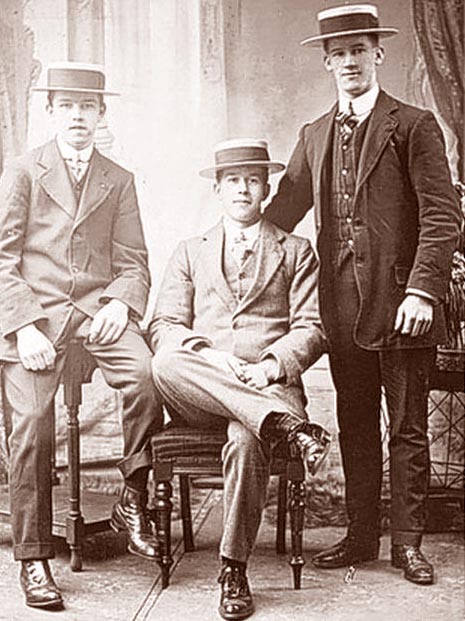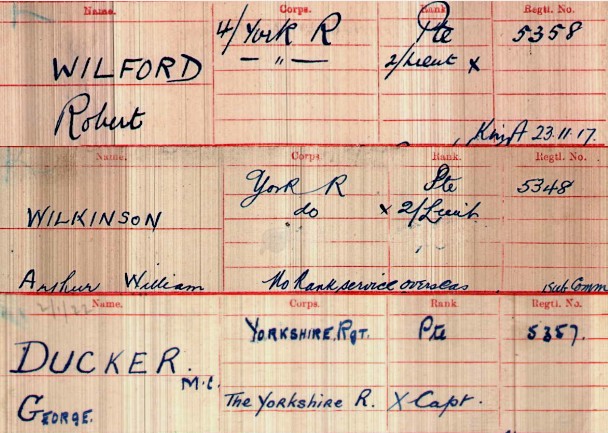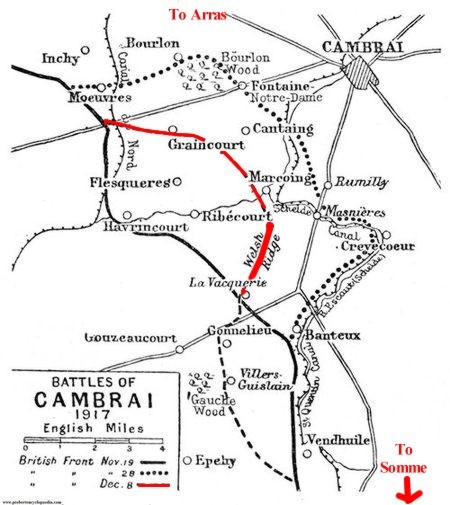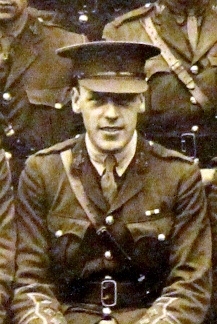Robert Wilford, Arthur William Wilkinson and George Ducker.
Three Officer Pals, who enlisted in the 4th Yorks Battalion as Privates.

Robert Wilford, Arthur William Wilkinson and George Ducker.
|
The information and images in this story have been researched and kindly contributed by Ray Wilkins of Middlesbrough.
In 1916 the three young men were on a Teacher Training course at Nottingham University, having enrolled together.
There is evidence that two of them protested at a poem in a University publication which encouraged students to enlist.
So it is possible that they joined up only when conscription was brought in.
However this may be, there is evidence that one of them, and likely all three, were in the University Officer Training Corps
and they were all to prove themselves when it came to action.
Two of them had gallant deaths at the Front and the third was awarded the Military Cross and survived.
They enlisted together and were placed in the 4th Yorks Battalion. Their Medal Cards show that they had virtually
consecutive Battalion numbers.
They never served abroad with the 4th Yorks, as their education and officer potential was recognised. All three were sent for Officer Training. They all gained their commissions on the 22nd November 1916.
Lt Robert Wilford.
He had won several scholarships and was destined to be a great asset to the Teaching profession.
He was commissioned into the 5th Yorks Battalion and attached to the 13th Yorks Battalion.
The 13th Battalion came under the orders of the 121st Brigade of the 40th Divsion.
In April/May of 1917 they took part in the capture of Fifteen Ravine, Villers Plouich, Beaucamp and La Vacquerie and in November in the Cambrai operations and the capture of Bourlon Wood.
Robert was killed in action on the Cambrai Front, aged 23, on the 23rd November 1917.
He was the son of Robert Levi Wilford and Mrs Jane Eliza Wilford of the Black Bull Hotel, Yarm, N Yorks.
The news was contained in a letter from a brother Officer, who spoke of him meeting
|

Medal Cards showing 4th Yorks Battalion numbers.
|
a hero's death, gallantly leading his men against the enemy.
William Brownlie, a Captain in the Royal Army Medical Corps wrote the following to his mother:-
"Dear Mrs Wilford,
I cannot tell you how exceedingly sorry I am that I am compelled to be the bearer of bad news.
Your son, was killed on the 23rd during an attack on very strong enemy positions. He was leading forward his men at the time, cheering them on and encouraging them in a particularly brave and gallant fashion, when he was shot through the head and killed instantly.
We are all exceedingly sorry to lose him. His ready smile and sunny disposition, his bright and winsome personality, had endeared him to everyone, and every remaining officer and man in the Battalion mourns with the loss of such a find and gallant soldier. His personal effects will be collected and sent to you through his bankers as soon as possible. If there is anything that I can do for you, please do not hesitate to write and ask. I shall esteem it a great privilege to be able to do anything in memory of such a gallant lad and personal friend. With the sincerest and most heartfelt sympathy with you in your great and sad bereavement."
|

|
2nd Lt Arthur William Wilkinson.
Like Robert Wilford, he was commissioned into the 5th Yorks Battalion and was attached to the 13th Yorks Battalion.
He was out with a party of the 13th Yorks putting up wire when he was struck by a shell during fighting in the Villers Guislain sector and died just minutes later, aged 23, on the 12th July 1917.
He was the son of Hannah H Wilkinson of North View Eston Yorks and the late John Wilkinson a former Ironstone mine platelayer.
At the 1911 census he was residing with his parents and siblings at 89 California, Eston, N Yorks and was employed by the North Riding Education Committee as a pupil Teacher.
His Captain, in a letter to Arthur's mother wrote:-
"It is with very great sorrow that I write to inform you of the death of your son, which occurred last night.
Your son was out with a party putting up wire, when he was hit by a shell and he and a Corporal were killed instantly.
It is impossible for me to express our feelings in the Company. We can hardly yet realise that he has passed on.
Your son won many honours out here and they were typified by the affection and respect of his men and the love of his brother Officers.
I myself regarded him as one of my truest friends and we have never had a better Officer.
Perhaps I can gather a little of the great loss you have suffered, as he frequently spoke to me of you and I can only offer you the slight comfort of knowing that he felt no pain, in fact his last moment was spent in joking with his orderly.
His revolver was smashed by the fragment of the shell.
|
The other Company Officers and men join with me in sending this message of sympathy and pray that God will give you the help and comfort at this time, when we are so powerless."
An old boy of Middlesbrough High School, he is commemorated on the school memorial plaque which can now be found displayed in Middlesbrough College. He is buried at Fins New British Cemetery, Sorel-le-Grand.
|

|
Captain George Ducker.
George was born in Jarrow, Co Durham, the son of a Coal Company worker.
At the 1911 census he is recorded as an 18 year old Pupil Teacher at the County Secondary School, where he had been taught himself from 1905.
He was living at 84 Stanley St, Blyth, Northumberland with 3 younger siblings.
In the same year he obtained a post as an uncertificated teacher.
He was a full time student at Nottingham University College from 1913 to 1915, in which year he became a cadet in the University Training Corps.
He joined the 4th Yorks Battalion as 5357 Private Ducker and was commissioned into the 5th Battalion of the Yorkshire Regiment.
In 1917 he was sent to France with the 13th Battalion of the Yorkshire Regiment and became a Company Commander.
He attained the rank of Captain and in 1918 was awarded the Military Cross.
The London Gazette of the 18th September 1918 gives the following citation:-
For conspicuous gallantry and devotion to-duty when in command of a Company. He showed initiative and resource in forming a defensive flank and holding his line against repeated enemy attacks.
By his gallant conduct and disregard for personal danger he set a fine example to his men.
|
From October 1918 to July 1919 he was on active service with the North Russian Expeditionary Force. His last Army appointment was as Chief Staff Office,
Seletskoe Detachment North Russian Expeditionary Force.
From 1919 to 1924 he returned as a part time student at Nottingham Uny College and obtained a BA at London University with Honours in English Language and Literature.
He went on to become Headmaster at Whitcliffe Mount Grammar School, Cleckheaton, Yorks and then Head of the Herbert Strutt School, Belper at the age of 43.
|
|



